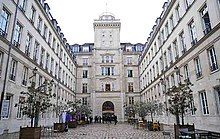User:Lagrange75/sandbox
 | |
| Established | October 9, 2020 |
|---|---|
| Mission | interdisciplinary fundamental research |
| Focus | Mathematics, Statistical Physics, Machine Learning, Computing, and Information Theory |
| President | Pierre-Louis Lions |
| Founder | Mérouane Debbah |
| Owner | Huawei |
| Address | 103 rue Grenelle |
| Location | , France |
| Website | www |
The Lagrange Mathematics and Computing Research Center is the Huawei's sixth research center in France. It is exclusively dedicated to fundamental research on the foundations of Mathematics, Computing, and Data Science. All generated research results are public and all organized scientific events are open. The center was built on a unique innovative structure model for industry, based on open long term research grants that support pioneering projects for top scientists. Named after the Franco-Italian mathematician Joseph-Louis Lagrange, the research center is located in central Paris. It was founded by Mérouane Debbah and advised by a prestigious scientific council that is presided by Pierre-Louis Lions (1994 Fields medalist).
History
[edit]Since 2013, Huawei had set up five other research centers in France which mainly focus on applied research such as artificial intelligence (Boulogne-Billancourt), design (Paris), image processing (Nice), sensors (Grenoble), and Algorithms (Paris). Complementary to these already established research centers and since mathematics have played a key role in the development of communication over the past 30 years, Huawei has decided to open the Lagrange Mathematics and Computing Research Center in Paris dedicated to fundamental research in mathematics and computation. This research center has been inaugurated on October 9, 2020 with the presence of Valérie Pécresse, president of Ile-de-France, the great Paris region, during the inauguration ceremony.
Mission
[edit]The main mission of the Lagrange Mathematics and Computing Research Center is "to help to push the boundaries of science in this field and prepare the breakthrough innovations of tomorrow", said Mérouane Debbah, founder of the Lagrange Research Center. In order to fulfill this goal, the Lagrange Mathematics and Computing Research Center aims to
- establish and fund a fundamental research and innovation discussion platform to attract worldwide elite scientists to communicate and innovate;
- undertake theoretical research responsibilities in two major fields of computational mathematics and data science, actively explore and study the development direction of the field, and lead the development of computing and data science;
- work closely with academia and research institutions to build a theoretical research platform, construct an open theoretical research ecological environment, and attract scientists to explore the originality theory together;
- practice and explore the best research model, adopt flexible employment and incentive policies, create a relatively relaxed and free research atmosphere, and stimulate the research enthusiasm of mathematicians and researchers.
Activities
[edit]The objective the Lagrange Mathematics and Computing Research Center is to bring together top scientists,with a focus on young scientistswho will work on the foundations of mathematics and data science, namely explainable artificial intelligence, its fundamental limits, post-Von Neumann architectures post-Moore’s law and post-Shannon. The research model is quite unique for the industry and structured around projects. The model retained for these projects is very similar to the one used by the European Commission (namely through the model of European Research Council -ERC- grants). Research proposals are evaluated by the Lagrange research center scientific council. Selected projects are financed for 3 to 5 years on disruptive fundamental topics. Currently, 4 projects with the following topics are financed:
- Big Scale Simulation and High Dimensional Sampling (leader: Prof. Éric MOULINES);
- Large Interacting Dynamical Systems (leader: Prof. Pierre-Louis LIONS);
- Fundamental limits of Computation with Neural Networks (leader: Prof. Helmut BOLCSKEI);
- Fundamentals of Optimal Transport Theory (leader: Prof. Alessio FIGALLI).
The Lagrange center also has a visitor program to attract the best scientists in the world.
Seminars and workshops are organized in a regular manner in collaboration with research partners, such as the Institute of High Scientific Studies (in France) as well as other renowned international institutions. Most slides and videos associated with these events are made available on the Lagrange center website or on its YouTube channel.
